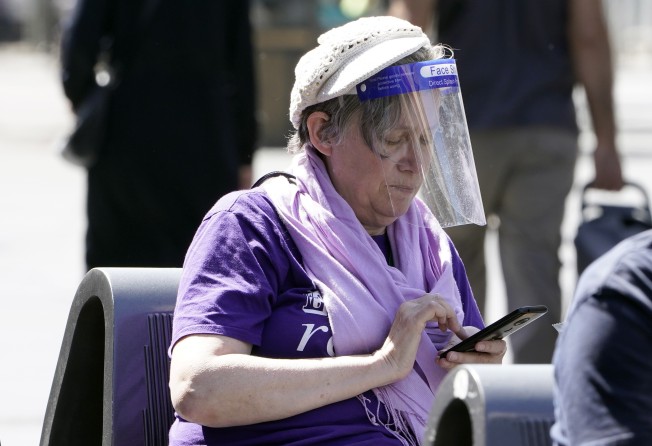UK scraps its own coronavirus-tracing app to join Apple and Google
- The original UK model had been criticised by privacy advocates for giving the government too much control over people’s data
- Tests showed the NHSX app identified 75 per cent of contacts of Android phone users, and just 4 per cent for Apple phone users

The UK abandoned efforts to create its own Covid-19 track-and-trace mobile app and will use Apple and Google technology instead, in a fresh setback for Prime Minister Boris Johnson.
After extensive testing of the domestic app developed by the state National Health Service’s digital arm NHSX and also of the app developed jointly by Apple and Alphabet’s Google, British authorities concluded both have flaws.
“We have agreed to join forces with Google and Apple to bring the best bits of both systems together,” Health Secretary Matt Hancock said on Thursday in a televised press conference. “I will not recommend people to download the app until I am confident that it’s the right thing to do.”
The delay in launching the app is the latest setback for Johnson, whose administration has been criticised for being slow to go into lockdown, not having enough ventilators or protective equipment and a failure to properly protect care homes.
“This is unsurprising and yet another example of where the government’s response has been slow and badly managed,” the opposition Labour Party’s health spokesman, Jonathan Ashworth, said in a statement. “It’s meant precious time and money wasted.”
The premier last month promised a “world-beating” test, track and trace system, and the government for weeks said the app would be an integral part of that. Hancock himself once pledged the technology would be ready for national roll-out by mid-May.
The switch has been anticipated since last month, when Bloomberg reported Britain’s app had been delayed by bureaucracy and the addition of more symptoms to monitor.
Using the solution proposed by the two tech giants will address some of the specific technical challenges identified in testing, according to a statement from Dido Harding, the former telecommunications industry executive who is leading the government’s tracing program, and Matthew Gould, head of NHSX.
UK authorities found the Google and Apple protocol was better at identifying contacts, although the UK’s independently-developed product did a superior job in judging the distance between two phones – a crucial element that helps inform whether people should be told to self-isolate after coming near an infected person.
Tests showed the NHSX app identified 75 per cent of contacts of Android phone users, and just 4 per cent for Apple phone users. The Google-Apple app identified 99 per cent of contacts on both platforms.
“Our app won’t work because Apple won’t change their system, but it can measure distance, and their app can’t measure distance well enough to a standard that we are satisfied with,” Hancock said.
The health secretary declined to put a new deadline for when the new app will be rolled out, and said that when it comes it will be the “cherry” on the cake of a test and trace system that has been in operation since the end of May with 25,000 contact tracers, including 7,000 clinicians. The UK has capacity to process more than 200,000 tests a day.
Data released by the Department for Health and Social Care on Thursday showed that in the week ending June 10, tracers reached 73 per cent of people who had contracted coronavirus to ask for details of their contacts. They then reached 90.6 per cent of close contacts of the Covid cases to advise them to self-isolate.
The technology efforts are among many voluntary mobile app projects being pursued by governments around the world that would use Bluetooth technology to trace possible infections and alert users when they may have been near someone infectious.
The original UK model had been criticised by privacy advocates for giving the government too much control over people’s data. Apple and Google’s system keeps the personal data on users’ devices. It updates the software on billions of phones so if a person notifies the system that they have Covid-19, people who have been near them get an alert saying they may be at risk.
The method removes some technical problems around interoperability and battery life. It is also considered a more privacy-conscious approach.
Some governments have criticised this decentralised system because it does not let authorities store data on who has the virus and track where it is spreading.